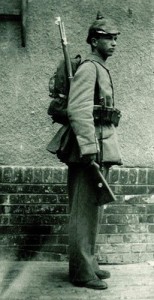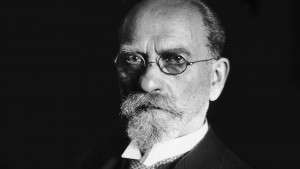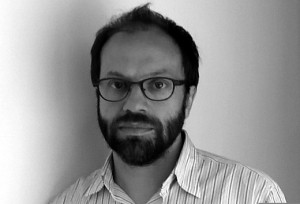文学部講演会 哲学研究の最先端 第3回 「〈人〉の悲劇 第一次大戦に臨むフッサール」 開催のご案内
[Please see below for English version]
岡山大学文学部では、文学部主催講演会「哲学研究の最先端 第3回」を下記のように開催いたします。多くの方のご参加をお待ちしております。
演題: 「〈人〉の悲劇 第一次大戦に臨むフッサール」
講師:ニコラス・ドゥ・ウォレン教授(ルーヴァン大学)
日時:2017年8月11日(祝) 14:00‒16:00
場所:岡山大学津島キャンパス 文法経1号館2F文学部会議室
 |  |
 |
※入場無料・事前申込不要
使用言語:英語(質疑には簡単な通訳がつきます)
共催:岡山哲学研究会
問い合わせ先:岡山大学文学部 植村玄輝(uemurag@okayama-u.ac.jp)
本講演は科学研究費補助金(課題番号:17K02172/代表者:竹島あゆみ)による助成を受けています。
講演要旨:
エトムント・フッサールとルドルフ・オイケンは生涯にわたって友好な関係にあった(オイケンは1926年に没するが、息子ヴァルターはフッサールがナチスによってフライブルク大学から追放された際に支援を行なった)。しかし両者は戦時における社会参加についてはまったく正反対である。オイケンが1914年にすぐさま戦争の哲学者(Kriegsphilosoph)という衣装を身に纏ったのに対して、フッサールは1917/18年にフィヒテの人間性の理想に関する「緊急戦時講義」で公衆に対して戦争について論じたに過ぎなかった。オイケンが戦後も(1919年に『ドイツの自由』で宣言したように)ドイツの自由という特別なミッションに関する自分の信念を揺るがせにすることがなかったのに対して、フッサールの現象学的思考は戦中と戦争直後を通じて重大な変容を被った。
本講演は、フッサールの戦時における公開講演と私的な書簡・研究草稿を並行して読み解くことによって、フッサールの倫理思想の変容と歴史の問題の発見、そして、大学教授という公人としてのフッサールと私人の哲学者としてのフッサール̶̶あるいは現象学の父と前線の二人の息子の父̶̶のあいだで顕在化する緊張関係に見取り図を与える。こうした変容は、哲学的なものとしても個人的なものとしても生じたのである̶̶つまり、フィヒテの「通俗的な倫理的作品」の読解と、一番下の息子ヴォルフガングの死(彼は1916年にヴェルダンで戦死した)を通じて。
本講演では、フッサールが「絶対的価値」を倫理学的に捉え「価値覚」を感情の形式とみなすようになる思想の発展の過程が吟味される。その際に重点が置かれるのは、犠牲の問題、そして、自分の息子と祖国に対して対立する義務を負った母親という繰り返し登場する例、別の言い方をすれば、フッサールが「〈人〉の悲劇(die Tragik der Person)」と呼んだものである。また、フッサールの現象学的思考が歴史の問題を発見するのが、第一次世界大戦によって降りかかった歴史の悲劇そのものを通じてであることが論じられる。さらには、1936年の『ヨーロッパ諸学の危機と超越論的現象学』に向かう軌道が、すでにフッサールの戦争体験および1922‒1924年の『改造』論文における「革新(Erneurung)」に関する最初の考察のなかですでにかたちづくられていることが示される。
Faculty of Letters at Okayama University Guest Lecture Series in Philosophy, Pt. 3
Prof. Nicolas de Warren (KU Leuven)
“Die Tragik der Person - Husserl at War”
14:00–16:00, 11 August, 2017
Venue: Faculty of Letters Meeting Room, Graduate School of Humanities and Social
Sciences Bldg. 1, Okayama University (Tsushima North Campus)
Joint Host: Okayama Tetsugaku Kenkyu-kai
Organizer: Genki Uemura (Okayama University) uemurag@okayama-u.ac.jp
This talk is also supported by KAKENHI (Grant No.: 17K02172 - PI: Ayumi Takeshima)
ABSTRACT:
Although they would remain life-long friends (Eucken died in 1926; Eucken’s son Walter would assist Husserl inthe 1930s when Husserl fell victim to banishment from Freiburg university by the Nazis), Eucken and Husserl were diametrically opposed in their war-time engagement. Whereas Eucken immediately took on the mantle of Kriegsphilosoph in 1914, Husserl only publically addressed the war in 1917 and 1918 in his “emergencywar-time lectures” on Fichte’s Ideal of Humanity. Whereas Eucken never wavered from his belief in the special mission of German Freedom after the war (as he declares in his 1919 book Deutsche Freiheit), Husserl’s phenomenological thinking underwent a significant transformation during and immediately after the war.
Through a parallel-reading of Husserl’s public war-time lectures and private war-time correspondence and research manuscripts, the present talk charts the transformation in Husserl’s ethical thinkingand his discovery of the problem of history, as well as the manifest tension between Husserl as public university professor—and father ofphenomenology—and private philosopher—and father of two sons at the front. This transformation of his ethical thinking is provoked philosophically as well as personally: through his war-time reading of Fichte’s “popular ethical writings” and through the death of his youngest son, Wolfgang, killed at Verdunin 1916.
Husserl’s development of an ethical conception of “absolute values” and emotional form of “value-apprehension” is examined with special emphasis on the problem of sacrifice and the recurring example of a mother’s conflicted duties towards her son and the Fatherland in his ethical reflections, or what he called “the tragedy of the person.” Husserl’s phenomenological thinking discovers the problem of history through the very tragedy of history that befalls him with the First World War. As further developed in the present talk, the trajectory towards the 1936 Crisis of the European Sciences already takes shape in Husserl’s experience of the war and his first reflections on“renewal” (Erneuerung) in his Kaizo articles in 1922–1924.
